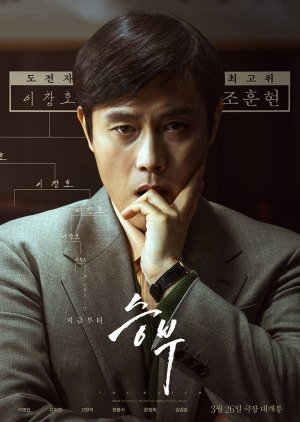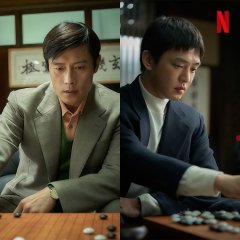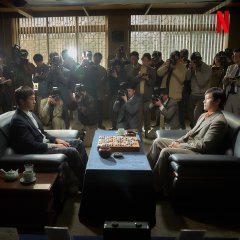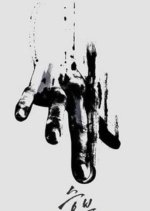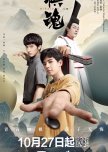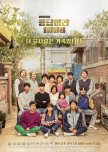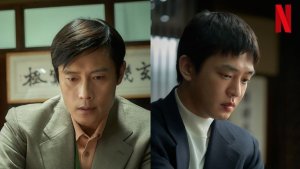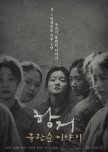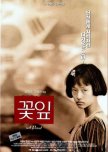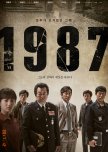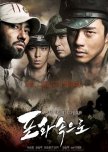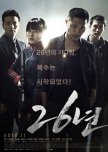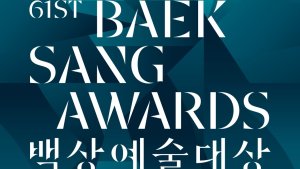 Drama & Film Winners Of The 61st Baeksang Arts Awards
Drama & Film Winners Of The 61st Baeksang Arts Awards Set in the 1980s-1990s, it tells the story of Cho Hun Hyeon, a Go champion who discovers a gifted but untrained young boy Lee Chang Ho in an amateur contest. He takes him under his wing to turn him into a professional player. Conflicts arise when the protégé later turns against his teachings. (Source: Wikipedia) ~~ Based on the real life of two Go players. Edit Translation
- English
- Русский
- Română
- Nederlands
- Native Title: 승부
- Also Known As: À Altura , A Partida , L'Ultima Partita di Go , Seungbu , Showdown , Матч
- Screenwriter: Yoon Jong Bin
- Screenwriter & Director: Kim Hyung Joo
- Genres: Drama, Sports
Where to Watch The Match
Subscription
Cast & Credits
- Lee Byung HunCho Hun HyeonMain Role
- Yoo Ah InLee Chang HoMain Role
- Ko Chang SeokCheon Seung Pil [Go reporter]Support Role
- Hyun Bong SikLee Yong Gak [Chang Ho's relative]Support Role
- Moon Jung HeeJung Mi Hwa [Hun Hyeon's wife]Support Role
- Kim Kang HoonLee Chang Ho [Young]Support Role
Reviews

This review may contain spoilers
Because sometimes the quietest films leave the deepest marks — through glances, silence, and soul
The Match – A Silent Duel and the Echo of a GameA board, 361 intersections, two players — and between them, an entire life: The Match is many things at once. A biographical drama about two icons of South Korean Go. A quiet tragedy about pride and letting go. And not least, a poetic exploration of a game that, in Korea, means far more than victory or defeat.
What captivates critics and fans alike is the film’s restraint. No dramatic bombast, no artificially inflated tension. Glances speak, cuts breathe, and silence lingers. Experts praised the precision: how actually real matches were re-enacted with exacting detail, and how the psychological depth of competition was rendered authentically. It is a film that resonates long after the credits roll because it speaks in subtleties: of ambition, betrayal, affection, and quiet determination.
At its heart: Lee Byung-hun as the driven veteran Cho Hun-hyun, defending his throne from his own protégé — and Yoo Ah-in as the gentle, reserved Lee Chang-ho, who speaks only through the board. Both deliver brilliant performances without pathos. Their glances are statements. Their hands speak louder than words. Especially striking: a scene where Cho sits alone in the dojang, sensing his student’s shadow — in silence. Yet thus he reveals everything. Supporting actors like Kim Kang-hoon (as young Lee) or Heo Sung-tae blend seamlessly into this atmosphere of quiet intensity.
So what is The Match really about? Not just Go. It’s about the fragile bond between mentor and student. About the question: when does leadership become control? When does gratitude become a shackle? And perhaps: how do you respond when your own “clone” becomes better — and turns your strategies into revolution?
Only against this backdrop does Baduk in The Match reveal its true meaning. It’s no coincidence that Korea's national heroes are born not on soccer fields, but at the Go board. Because here, the game is not mere competition, but a quiet cultural treasure — a space where personality reveals itself, even when lips stay silent. The Match is not just a story of two players — it’s an explanation of why that story matters.
------------------------------------- side note on baduk ---------------------------------------------------
MORE THAN A GAME: BADUK IN KOREA
It’s fascinating how such a quiet sport can shape the thinking of a society. To outsiders, it might look like a dry ritual: two players leaning silently over a wooden board, fingers poised over black or white stones, a soft click on lacquered wood — and seemingly not much happening. But in Korea, Baduk is far more than a game. It’s a mindset. A way of life. A mirror of character. And for some, a destiny.
Its roots reach back to the 1st century BCE, yet it’s more alive than ever — on TV screens, in schools, street cafés, and quiet dojangs. Millions watch live tournaments on television, narrated by experts who analyze every stone like a line of poetry. Children attend Baduk academies while their peers elsewhere take to soccer fields. Because here, it’s not about goals — it’s about thinking in long arcs.
What makes Baduk in Korea so unique is its philosophical depth. It shows how character takes shape: Who takes risks? Who builds with foresight? Who sacrifices wisely? It rewards patience and long-term strategy — often across dozens of moves. Koreans don’t call it “waiting,” but ´insight´.
The rules are simple — capture by encirclement, passing, the K.O. rule — and yet it unfolds into a universe with more possible games than atoms in the cosmos. No match is the same. And when two evenly matched players meet, something poetic happens: a poem in black and white.
In a country marked by speed, change, and technology, Baduk feels almost anachronistic. And yet that’s where its power lies. It represents the contemplative, disciplined, and introspective Korea. It teaches us to leave space — and still be present. To anticipate setbacks — and turn shadows into strength. To play Baduk is to learn more than rules: it’s to learn posture.
Lee Chang-ho, around whom The Match revolves, was known as the master of silence. He didn’t win through aggression — but by avoiding mistakes. His style was almost invisible, yet unstoppable — like water. It’s no wonder he became a hero. And the film, a mirror of that quiet greatness.
Was this review helpful to you?

A Quiet Duel of Legacy and Pride
*The Match* is a compelling drama film based on the real-life relationship between two of South Korea’s most iconic Go players: Cho Hun-hyun and his protégé-turned-rival, Lee Chang-ho. Set in the early 1990s, the film traces their journey from a bond of deep respect and trust to a dramatic confrontation on the board that reshapes both their lives.The performances are the heart of this film. Lee Byung-hun is remarkable as Cho Hun-hyun, portraying a man torn between pride in his student and fear of being replaced. Yoo Ah-in brings a quiet intensity to Lee Chang-ho, expressing his character’s transformation from an obedient disciple into a confident and self-assured challenger. Their dynamic carries the film, grounding its emotional weight in realism and restraint.
The direction is subtle and patient. The film avoids melodrama, opting instead for a slow build of tension through deliberate pacing. The cinematography treats the Go board like a battlefield, using close-ups and careful lighting to give weight to every move.
One of the film’s strengths lies in its dialogue, which is thoughtful and philosophical. Lines like “A teacher is not someone who gives answers, but someone who opens the way” resonate far beyond the context of the game. The screenplay explores the loneliness of mastery, the burden of legacy, and the moment when every student must eventually step out of their teacher’s shadow.
There is also warmth and humor throughout the film, which balances the more intense moments. These touches humanize the characters and make their emotional journey all the more relatable.
It is a meditation on ambition, mentorship, and the bittersweet nature of growth. It’s a film that lingers because of the quiet, personal truths it reveals in the spaces between each move.
Was this review helpful to you?

